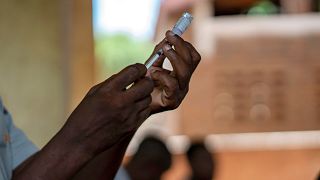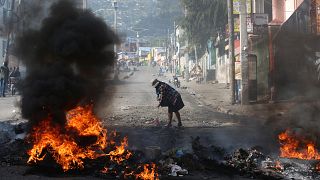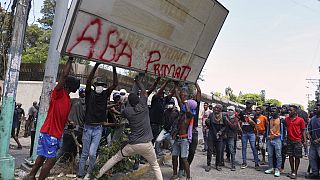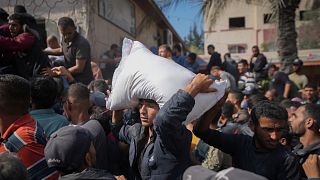Haiti
Aid packages were handed out on Saturday to displaced families camping at a soccer field in the Haitian city of Les Cayes following last week's devastating earthquake.
The parcels containing food and sanitary items were distributed to those left homeless in the aftermath of the 7.2-magnitude quake.
Footage showed scuffles among the anxious crowd at the Gabion field to get hold of the packages.
Nedgy Souvenet said the situation was "not good", compounded by the weather, while Desire Claudette said she had been told she was not able to camp at the site.
The disaster, which hit the southwest of Haiti the hardest, killed nearly 2,200 people, injured more than 12,000, and destroyed or damaged more than 10,000 homes.
- Haiti Earthquake Aftermath -
In Haiti's hard-hit city of Les Cayes some attended outdoor church services on Sunday because sanctuaries had been badly damaged by the earthquake as the death toll continued to rise.
Haiti's Civil Protection Agency said Sunday the toll from this month's magnitude 7.2 earthquake has grown to 2,207, with 344 people still missing.
The previous figure had been 2,189 on Wednesday.
The agency said via Twitter that 12,268 people were injured and nearly 53,000 houses were destroyed by the Aug.- 14 quake.
The new toll comes at a time when relief operations are expanding — the U.S.-based aid agency Samaritan's Purse opened a field hospital Saturday — but authorities are struggling with security at distribution points.
Gangs have hijacked aid trucks and desperate crowds have scuffled over bags of food.
Private donations have also been set up to assist with distribution of food and clothing.













01:06
UN warns of deepening Haiti crisis
Go to video
Protesters in Haiti demand protection against gangs
Go to video
At least 14 million children worldwide risk malnutrition, warns UNICEF
00:29
UN details 137 percent increase in aid workers deaths
Go to video
Pics of the day: March 26, 2025
Go to video
Pics of the day: March 20, 2025